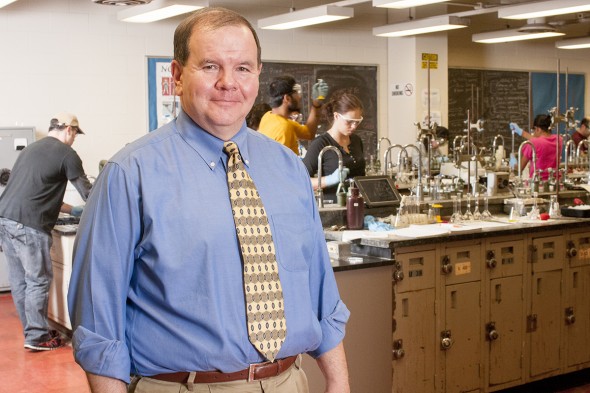University Scholar Donald Wink: strengthening STEM
The University Scholars Program, now in its 29th year, honors faculty members for superior research and teaching, along with great promise for future achievements. The award provides $10,000 a year for three years.
Before the national effort to improve science education made STEM — science, technology, engineering and math education — a buzz word, Donald Wink was developing project-based methods for teaching chemistry.
“Project-based learning is based on the idea that if you know something you should be able to use it and, in the process of using it, what you know not only becomes more meaningful but your knowledge becomes stronger,” said Wink, who trained as a synthetic chemist.
Wink’s project-based curriculum development resulted in two textbooks used at many universities, The Practice of Chemistry and Working with Chemistry.
“Only a handful of the many hundreds of NSF-funded curriculum and materials development projects of the last 20 years have reached this stage, a clear mark of the excellence of the work,” said Luke Hanley, professor and head of chemistry.
Wink went to other UIC departments that require their students to take chemistry courses and asked them why they wanted their students to study chemistry.
He then developed projects based on real-world problems, such as understanding the ecosystem and its role in climate change.
These projects give students a chance to see how chemistry techniques can be used in the real world.
Wink is working with College of Education faculty members, including Prof. Maria Varelas, to develop science education for future elementary school science teachers. He played an important role in establishing the NATS (natural sciences) course sequences in the College of Liberal Arts and Sciences.
His other major area of collaboration is with the Chicago community, particularly high school science teachers.
“This kind of work, ‘the scholarship of engagement,’ is rare in science departments,” Hanley said.
“My work has been oriented towards teaching,” Wink said. “I’m especially proud to work with our undergraduates — they’re a really cool bunch.”
Developing effective ways to teach science may not result in long lists of journal articles, but “these are important problems that the university has supported me in engaging,” Wink said.
“I’m particularly gratified by this recognition, because this is not an area of scholarship that results in the 50 research publications that are usually recognized by academic awards,” he said.

